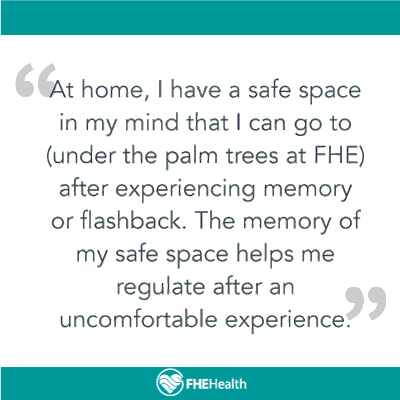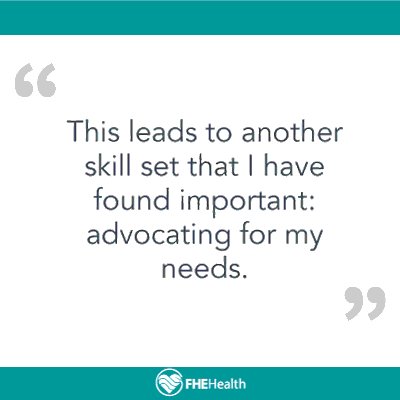
Post-Traumatic Stress Disorder (PTSD) is a tricky beast. While the diagnostic symptoms like nightmares, flashbacks, emotional and physical reactions to triggers, avoidance, increased negative impacts, and sometimes dissociative occurrences are across the board, from what I have seen, navigating PTSD and its impacts are different for everyone. Just as the trauma a person experience is unique to them, so is the recovery. It is so unique that multiple people can experience the same events but not experience PTSD. Like I said, it’s a tricky beast.
That being said, this is all written from my own personal experience of learning to navigate my PTSD. What I share may or may not help you and is not to replace the advice of a professional.
What works for me is unique to me but may give you some recovery ideas.
Admit My Trauma
The first step in my learning to navigate PTSD was admitting I have trauma. It was also the most difficult. I did not want to share my trauma with anyone because I thought it would hurt them. But going through FHE allowed me to be able to have a safe space to admit what happened. I was able to share my secrets that I had buried deep down with safe people and not hurt them.
Have a Safe Space
 I NEEDED the safety of FHE and the distance from day-to-day life to admit my secrets. This safety allowed me to explore how my trauma-impacted me, share detailed memories with professionals, and begin to accept my trauma. At home, I have a safe space in my mind that I can go to (under the palm trees at FHE) after experiencing memory or flashback. The memory of my safe space helps me regulate after an uncomfortable experience.
I NEEDED the safety of FHE and the distance from day-to-day life to admit my secrets. This safety allowed me to explore how my trauma-impacted me, share detailed memories with professionals, and begin to accept my trauma. At home, I have a safe space in my mind that I can go to (under the palm trees at FHE) after experiencing memory or flashback. The memory of my safe space helps me regulate after an uncomfortable experience.
Another key to my acceptance has been to create a different view of my trauma. I like movies and since I have young kids, Disney movies are a part of my daily life and a tool I have used to help me view my trauma in a less scary way. For example, in the movie Frozen, when Kristoff comes home to the trolls, they all roll up at once and it is overwhelming to him because all the trolls want his attention. That’s how I view my trauma; sometimes it seems to roll up on me all at once. By changing the view of my trauma into something I am not afraid of, it helps me reduce the fear around navigating it and allows me to assess what the trigger may have been.
Know the Triggers
Knowing triggers, for me, can feel like trying to navigate the steam vents of Scar’s lair in the song “Be Prepared” from Lion King. While I know what most of them are, sometimes new ones pop up out of what seems like nowhere. But having tools to navigate them helps me not get burned.
Have Multiple Tools
Just like everyone’s trauma is unique to them, so are their navigation tools. As my recovery has grown, my tools have changed along the way. But the one that remains consistent is using my senses.
When a flashback pops up, it’s like it consumes all of me and I am reliving that event. In order to bring myself back to the present, I engage my senses. The main way I do that is 5 things I can see, 4 things I can feel, 3 things I can hear, 2 things I can smell, and 1 thing I can taste. Some of my tools cover more than one sense. I keep them basic and easily accessible.
My keys are on a stretchy band that I can put on my wrist when needed. I can see my stretchy band, my keys, the colors, names on my key-tags, and my favorite keychain. I can feel the twists in my stretchy band, the ridges of my keys, the smoothness of key tags, and the squishiness of my favorite keychain. I can hear the jangle of my keys, the flick of my fingernails on the edges of my keys, and the sound keys make against the key tags. Now, smelling my keys or trying to taste them is not something I want to do or advice. So in my kit, I have a favorite essential oil (Lavender) and some chocolate. I can easily smell the oil and then smell the chocolate. The best part about the chocolate is that I can then taste it! This can be done with your favorite candy that is safe for your body.
Do The Opposite
Another favorite tool I have is one that appeals to my stubborn side. I do the opposite of what I want to do. To clarify, this only works when faced with things that may be unhealthy or unsafe for my recovery. If I want to choose a safe coping tool, I absolutely need to choose the healthy and safe tool, not the opposite.
However, when I experience a trigger and my body screams “FREEZE!” I do the opposite. I move. This can be something as simple as moving my arm in a figure 8 or writing the alphabet in the air with my feet.
Recently, I was at the dentist and my appointment was going longer than I anticipated. Near the end I started experiencing flashbacks. It’s probably not advised to eat chocolate while getting my teeth cleaned. So, I knew I had to move because my body was freezing up on me. I said, “I need to sit up.” And thankfully, they finished the exam on me while sitting up.
Simply sitting up allowed me a change of view, have more movement, feel more in control, and ultimately feel respected. These small changes added up to a big experience for me. I was able to get through the flashback more easily and get my teeth sparkly clean.
Advocate For My Needs
 This leads to another skill set that I have found important: advocating for my needs. This one has been a hard one to learn because boundaries are not something I was taught. But by expressing my boundaries, I have been able to be more present. I advocated for myself during my dentist appointment and was able to navigate it. Another example of expressing my boundaries is stating “Please don’t hug me without permission” and “Please let me know if you are behind me.” Most people in my circle do this. This helps prevent sudden reactions from me by letting me be more aware of what is going on around without being hypervigilant.
This leads to another skill set that I have found important: advocating for my needs. This one has been a hard one to learn because boundaries are not something I was taught. But by expressing my boundaries, I have been able to be more present. I advocated for myself during my dentist appointment and was able to navigate it. Another example of expressing my boundaries is stating “Please don’t hug me without permission” and “Please let me know if you are behind me.” Most people in my circle do this. This helps prevent sudden reactions from me by letting me be more aware of what is going on around without being hypervigilant.
It Takes Time
My journey of recovery has not always been so smooth. It’s been two years since I returned home from FHE. Those two years have required lots of practice with my tools. Sometimes I have had to change my recovery tools because they weren’t working for me and find ones that worked better. Recovery is like that. It’s a journey.
It’s a journey that wouldn’t have begun without the most important step of asking for help. FHE was my first and most important step in getting on the recovery path. Following up with tools and skills learned after getting home is what has carried me this far.
On my recovery journey I have learned to admit my trauma, create a safe space, know my triggers, have multiple tools, and how to best use my tools. Just as my trauma is unique to me, so is my recovery toolbox. All the different tools come together to build a solid house of recovery for myself. I hope that on your journey, you will find the tools that work for you. You are worth recovery!






